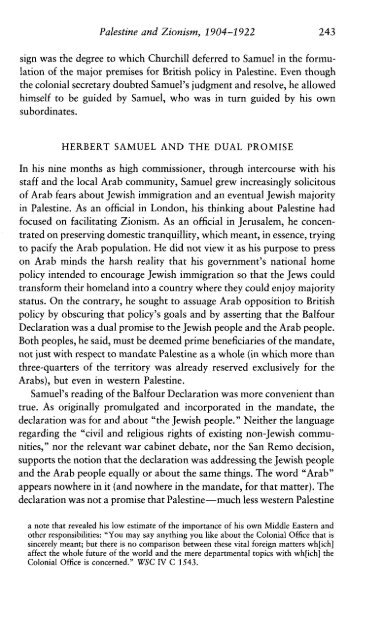Churchill, Palestine and Zionism, 1904-1922 - Douglas J. Feith
Churchill, Palestine and Zionism, 1904-1922 - Douglas J. Feith
Churchill, Palestine and Zionism, 1904-1922 - Douglas J. Feith
Create successful ePaper yourself
Turn your PDF publications into a flip-book with our unique Google optimized e-Paper software.
<strong>Palestine</strong> <strong>and</strong> <strong>Zionism</strong>, <strong>1904</strong>-<strong>1922</strong> 243<br />
sign was the degree to which <strong>Churchill</strong> deferred to Samuel in the formulation<br />
of the major premises for British policy in <strong>Palestine</strong>. Even though<br />
the colonial secretary doubted Samuel's judgment <strong>and</strong> resolve, he allowed<br />
himself to be guided by Samuel, who was in turn guided by his own<br />
subordinates.<br />
HERBERT SAMUEL AND THE DUAL PROMISE<br />
In his nine months as high commissioner, through intercourse with his<br />
staff <strong>and</strong> the local Arab community, Samuel grew increasingly solicitous<br />
of Arab fears about Jewish immigration <strong>and</strong> an eventual Jewish majority<br />
in <strong>Palestine</strong>. As an official in London, his thinking about <strong>Palestine</strong> had<br />
focused on facilitating <strong>Zionism</strong>. As an official in Jerusalem, he concentrated<br />
on preserving domestic tranquillity, which meant, in essence, trying<br />
to pacify the Arab population. He did not view it as his purpose to press<br />
on Arab minds the harsh reality that his government's national home<br />
policy intended to encourage Jewish immigration so that the Jews could<br />
transform their homel<strong>and</strong> into a country where they could enjoy majority<br />
status. On the contrary, he sought to assuage Arab opposition to British<br />
policy by obscuring that policy's goals <strong>and</strong> by asserting that the Balfour<br />
Declaration was a dual promise to the Jewish people <strong>and</strong> the Arab people.<br />
Both peoples, he said, must be deemed prime beneficiaries of the m<strong>and</strong>ate,<br />
not just with respect to m<strong>and</strong>ate <strong>Palestine</strong> as a whole (in which more than<br />
three-quarters of the territory was already reserved exclusively for the<br />
Arabs), but even in western <strong>Palestine</strong>.<br />
Samuel's reading of the Balfour Declaration was more convenient than<br />
true. As originally promulgated <strong>and</strong> incorporated in the m<strong>and</strong>ate, the<br />
declaration was for <strong>and</strong> about "the Jewish people." Neither the language<br />
regarding the "civil <strong>and</strong> religious rights of existing non-Jewish communities,"<br />
nor the relevant war cabinet debate, nor the San Remo decision,<br />
supports the notion that the declaration was addressing the Jewish people<br />
<strong>and</strong> the Arab people equally or about the same things. The word "Arab"<br />
appears nowhere in it (<strong>and</strong> nowhere in the m<strong>and</strong>ate, for that matter). The<br />
declaration was not a promise that <strong>Palestine</strong>-much less western <strong>Palestine</strong><br />
a note that revealed his low estimate of the importance of his own Middle Eastern <strong>and</strong><br />
other responsibilities: "You may say anything you like about the Colonial Office that is<br />
sincerely meant; but there is no comparison between these vital foreign matters wh[ich)<br />
affect the whole future of the world <strong>and</strong> the mere departmental topics with wh[ich) the<br />
Colonial Office is concerned." WSC IV C 1543.


